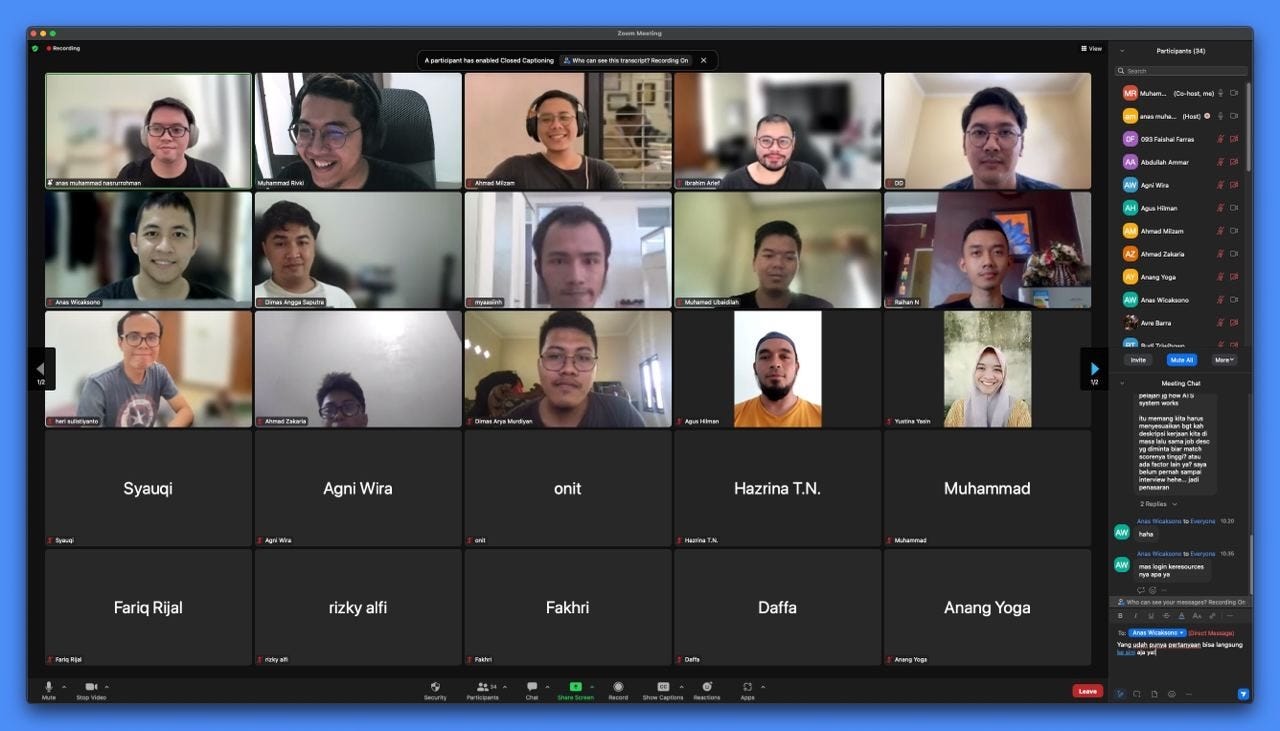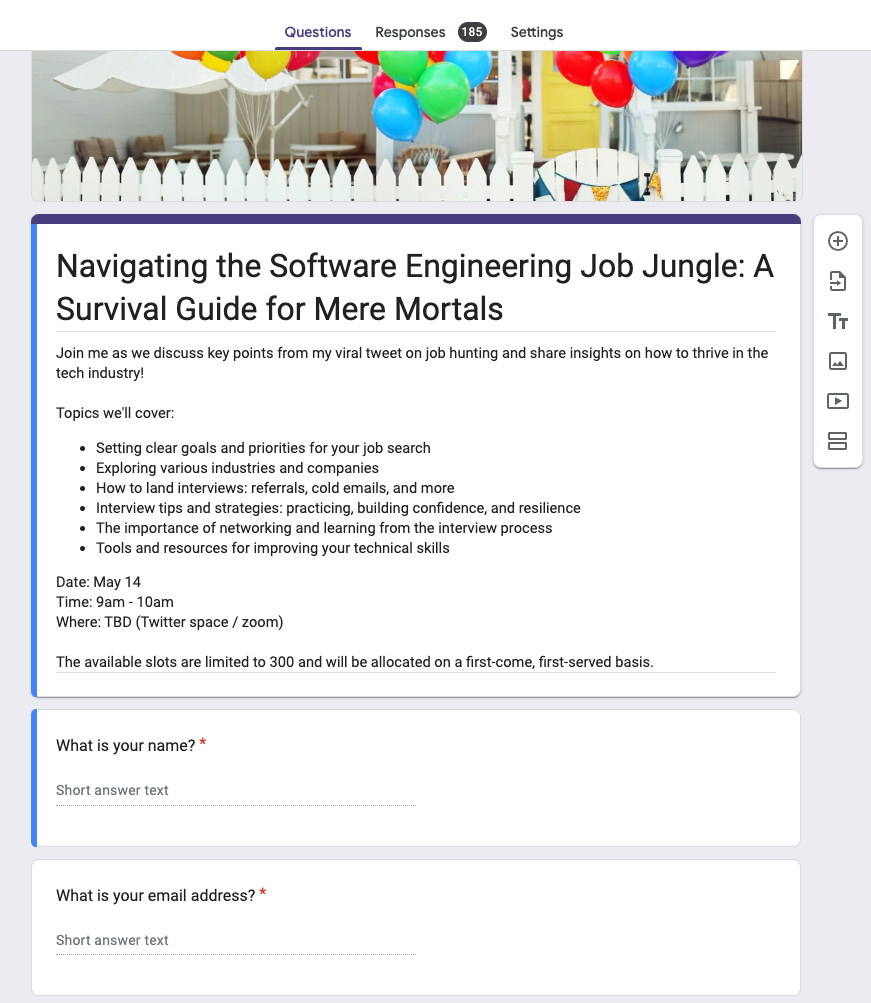Don't Be Your Own Worst Critic
About two weeks ago, I casually shared my job hunting journey on Instagram stories, hoping that it could provide some helpful insights during this tech winter season. To my surprise, this sparked interest among my followers. This simple sharing session morphed into a popular Twitter thread (in Bahasa Indonesia) and a week later, it evolved into an online sharing session, drawing in over 180 participants.
The Twitter thread wasn't a global sensation, but it gained some traction. It attracted over 68k views, hundreds of retweets, likes, and direct messages. For someone like me, a Twitter user since 2009 with a tendency to stay quiet and a modest follower count of 300, this was a big change.
I saw this as my chance. It was an opportunity to expand my presence, grow my audience, and muster up the courage to share more of my story.
I understand the nature of virality. It's fleeting. I could gain over 100 followers in a matter of days, but soon, things would return to normal.
Yet, I wanted to ride this unexpected wave. To see how far it could take me. I also wanted to make a difference. To help others better prepare for their own quests in the field of software engineering. Even if the impact was small, I think my experiences could be useful for some people.
I can't deny the allure of increasing my Twitter and newsletter following. As a software engineer and an aspiring entrepreneur, a large audience can be quite beneficial when launching new products.
However, my ultimate wish goes beyond mere numbers. I yearn to see tangible change in the world. I hope to contribute to enhancing the tech community in my home country, Indonesia. Every small improvement counts.
We know that online sensations can spark meaningful action. I also understand that my small venture won't cause a seismic shift. However, it could touch the lives of a few, just like a pebble creating ripples in a pond.
For me, that's more than enough.
So, when my Twitter thread started gaining traction, like a snowball rolling downhill, I decided to use this as a stepping stone. I organized an online sharing session where I could share a more comprehensive narrative, expand on the insights from the Twitter thread, and answer the flurry of questions that I had received.
I created a form and broadcasted it on Twitter. There'd be an online discussion about Navigating The Software Engineering Job Market in a week, and anyone interested could register via the link.
I wasn't sure what to expect. A cocktail of emotions stirred within me – embarrassment, curiosity, doubt. I found myself wondering if this initiative was worth it. It was an uncharted path for me, after all.
The event was to be put together in a week with no concrete plan or preparation in sight. But, this is also outside of my comfort zone, hence this might be a good opportunity for me to grow.
Thirty minutes after I published the announcement, only three people had registered. A sense of shame crept in – was this a misstep? I even confided in my wife that if the sign-ups didn't cross 20 in three days, I'd call off the event and settle for sending out a PDF.
I went to bed soon after.
Come monday afternoon, and the scene had changed – 60 registrations and counting. Retweets multiplied and the following day saw over 120 sign-ups. This was becoming serious.
A wave of excitement rushed over me, tinged with fear, as I had not yet made any preparations.
Questions also flooded in: Can I just wing it for 40 minutes with no set structure or slides? Will a free Zoom account support a session longer than an hour with over 100 attendees? (answer: it doesn't)
Despite the initial hurdles and time crunch, the sharing session was a success, and for that, I am grateful.
While I wouldn't recommend anyone to organize such an event in just a week, this endeavor felt worthwhile. I felt a deeper connection to the community, and the feedback was heartening.
Lessons in Echoes
What has this experience taught me?
We've all experienced that sense of awe when witnessing someone else's ingenious work or hearing an extraordinary tale. They seem exceptional, inspiring, and flawless, while our own stories feel commonplace, uninspiring. “I could never be as innovative or brave,” we tell ourselves.
After sharing my stories about my humble beginnings and the unexpected seminar, I received an email that said, "Thank you for sharing your knowledge. It was inspiring!" I initially brushed it off, thinking that my stories were nothing remarkable.
But then I realized that our own stories often seem mundane to us.
Perhaps even great minds like Richard Feynman and Ben Franklin felt that their ideas were self-evident. But to others, they were revolutionary.
So could it be that what's obvious to me is amazing to someone else?
In this digital era, amplifying our voices and sharing our stories is more crucial than ever. It allows us to reach wider audiences, build relationships, garner feedback, and motivate action.
Just be authentic and genuine.
Be helpful and supportive.
Be consistent.
Be patient.
Often, we are our own worst critics. Yet, it should be the world that judges our ideas. Share your journey, and you may inspire and resonate with more people than you can imagine.
P.S. A shout out to Rikvi, who helped me pull off the session at such short notice. The event's success owes a lot to him!




